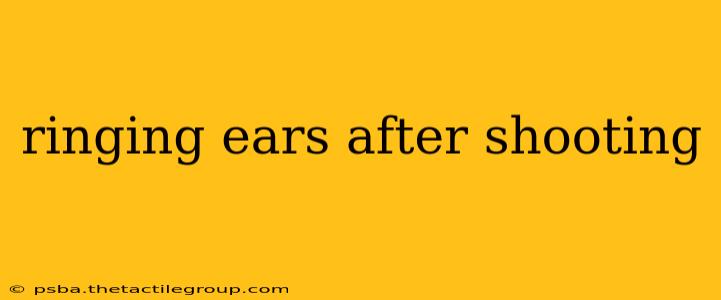Ringing in the ears, medically known as tinnitus, is a common complaint among shooters. The loud noises associated with firearms discharge can cause temporary or, in severe cases, permanent hearing damage, leading to this persistent ringing. This article explores the causes of tinnitus after shooting, effective prevention strategies, and what to do if you experience this uncomfortable condition.
Understanding the Link Between Shooting and Tinnitus
The intense sound produced by firearms significantly exceeds safe noise levels. Exposure to these high-decibel sounds, even for short periods, can damage the delicate hair cells within the inner ear, responsible for transmitting sound signals to the brain. This damage disrupts the normal functioning of the auditory system, resulting in the perception of ringing, buzzing, hissing, or clicking sounds – tinnitus.
The severity of tinnitus depends on several factors:
- Noise level: Higher decibels equate to a greater risk of hearing damage.
- Duration of exposure: Prolonged exposure to loud noises increases the likelihood of developing tinnitus.
- Frequency of exposure: Regular shooting sessions without proper hearing protection drastically increases the cumulative risk.
- Individual susceptibility: Some individuals are naturally more susceptible to noise-induced hearing loss than others.
Types of Tinnitus Related to Shooting
Tinnitus resulting from shooting can manifest in various ways:
- Acute tinnitus: This type of tinnitus is temporary and usually subsides after a few hours or days. It's often experienced immediately after shooting sessions.
- Chronic tinnitus: This persistent ringing can last for weeks, months, or even years. Chronic tinnitus often indicates more significant hearing damage.
- Subjective tinnitus: This is the most common type, where only the individual experiencing the ringing can perceive it.
- Objective tinnitus: In rarer cases, a doctor can also hear the sound. This often points towards a more serious underlying medical condition.
Preventing Tinnitus from Shooting: Essential Safety Measures
Preventing tinnitus is significantly easier than treating it. Implementing the following safety measures is crucial for protecting your hearing while shooting:
1. Invest in High-Quality Hearing Protection:
This is the single most effective preventative measure. Choose hearing protection that provides sufficient noise reduction ratings (NRR). Consider:
- Electronic muffs: These muffs amplify ambient sounds while reducing the intensity of loud noises like gunshots.
- Foam earplugs: These are affordable and readily available, offering good protection when used correctly.
- Custom-molded earplugs: These provide a more comfortable and effective fit than standard earplugs.
Important Note: Always ensure your hearing protection fits correctly and seals properly to maximize its effectiveness.
2. Maintain Safe Distances:
The further you are from the firearm when it discharges, the lower the sound intensity you will experience. This is particularly important when shooting in enclosed spaces or ranges where sound reverberates.
3. Regular Hearing Checkups:
Regular hearing tests can help identify early signs of hearing loss or tinnitus. Early detection allows for quicker intervention and potential mitigation strategies.
4. Limit Exposure:
While shooting is a rewarding hobby, limiting the frequency and duration of your shooting sessions can help reduce your overall exposure to loud noises. Take regular breaks during extended shooting activities.
What to Do if You Experience Ringing Ears After Shooting
If you experience ringing in your ears after shooting, even if it's temporary:
- Rest your ears: Avoid further exposure to loud noises.
- Stay hydrated: This can help reduce inflammation in the ears.
- Consult a doctor: If the tinnitus persists for more than a few days, or if it's accompanied by other symptoms like hearing loss or dizziness, seek medical attention immediately.
Conclusion
Protecting your hearing while shooting is paramount. Implementing preventative measures like using high-quality hearing protection, maintaining safe distances, and limiting exposure can significantly reduce the risk of developing tinnitus. Remember, addressing tinnitus promptly is vital for preventing long-term hearing problems. Always prioritize your hearing health and safety.

